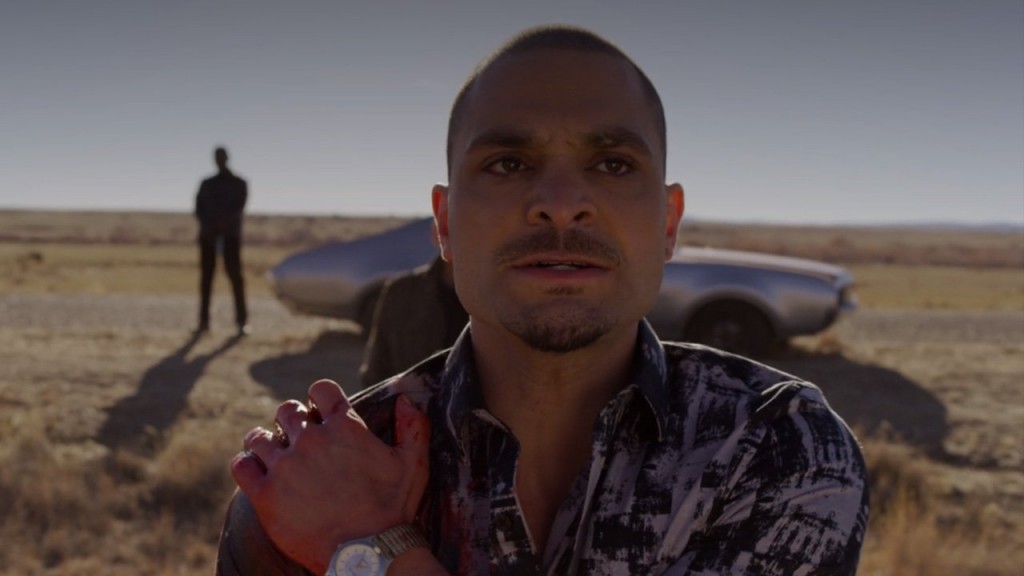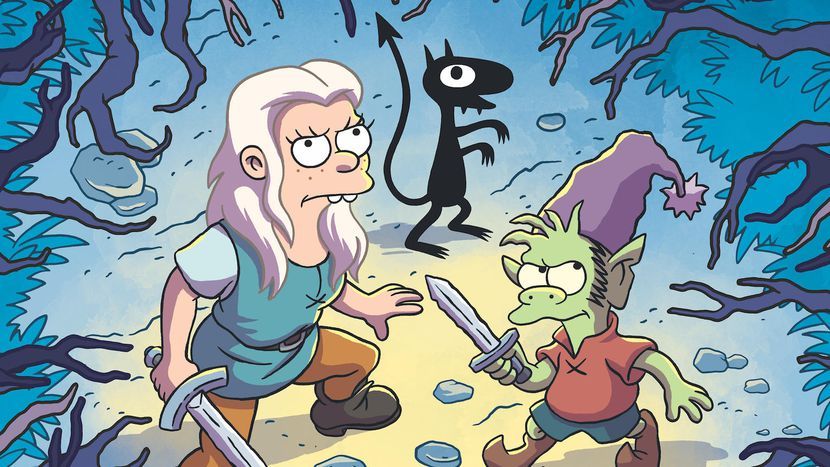-
Recent Posts
- Better Call Saul: There Are No Happy Endings between a “Rock and Hard Place”
- Black Widow Keeps It in the Family for Natasha’s Last Ride
- Loki Finds New Purpose in the Man behind the Mischief
- In its Debut, Star Wars: The Bad Batch Decides Whether to Obey or Rebel
- Nomadland: A Film Out of Time, For Our Times
Archives
Recent Comments
- unblocked games 76 on The Walking Dead: The Division and Reunion in “Hearts Still Beating”
- tombolbet88 link alternatif on The Walking Dead: a Glimpse of the New World in “Knots Untie”
- bali777 login on Veep’s Series Finale and the Hollowness of Getting What You Want
- Ed Clarke on Contact
- Matt on Why “The Frying Game” Is a Dark Horse Contender for The Simpsons’s Worst Episode Ever
Meta
Monthly Archives: August 2018
Better Call Saul: Nacho and Kim Are in Too Deep in “Something Beautiful”
The end of “Something Beautiful” makes me think of a scene from “Nailed”, the penultimate episode of Better Call Saul’s second season. In that episode, Chuck McGill confronted Kim and Jimmy about the suspected switcheroo with the Mesa Verde files. He impugned his brother’s character and told Kim to open her eyes, saying that Jimmy committed these misdeeds for her as part of a “twisted romantic gesture.”
But Kim defended Jimmy. She admitted that he’s not perfect, but argued that he was still a good person and someone she pitied in light of how much he ached for his brother’s love, a love that he would never get. She chastised Chuck for denying Jimmy that and for judging him, for threatening to inflict such consequences on him, and denied Chuck’s theory as crackpot. But then, when she was alone with Jimmy, she betrayed her true feelings. She punched Jimmy in the arm. She expressed her frustration, because she’s no fool; she knew he did it, and she thought that Chuck was right — that he did it for her.
Moana Is a Cheery Throwback to the Heights of the Disney Renaissance
There is a little bit of magic in Disney films of a certain stripe, when the music swells and the counterpoint kicks in and the protagonist hears the call to adventure and your cold, icy heart can’t help but melt just a little as you feel the hero’s same pull toward the horizon and mix of excitement and trepidation over the sheer possibilities. Moana is filled to the brim with these moments, the kind that make the most of the hero’s journey the films sets its eponymous protagonist on. And it capitalizes on Moana’s unique combination of self-confidence, internal conflict, and gnawing uncertainty, that give her layers and make her a compelling figure.
Posted in Animated Films, Movies
Tagged Animation, Computer Animation, Disney, Duane Johnson, Movie Reviews, Musicals, Walt Disney Animation Studios
Leave a comment
Better Call Saul and the Choices We Don’t Have to Make in “Breathe”
One of the most interesting questions to ask — for both real people and characters on television — is why someone chooses to do things they don’t have to. The realities of life can push people toward certain choices, and circumstances often dictate actions. But there are situations in which there’s no external force, no rules or sticks or carrots to poke or prod, just a raw choice to be made. It’s these sorts of choices that can reveal who someone really is and what they’re going through, in a way that’s clearer than with choices that are muddied by pressure and inertia and need.
These are the types of questions that “Breathe” is interested in. Why is Gus Fring not only trying to keep Hector Salamanca alive, but also moving against those who tried to kill him? Why is Kim Wexler attending a meeting to determine Jimmy’s share of Chuck’s estate when Jimmy himself is blowing it off? Why is Mike Ehrmantraut determined to perform his “security consultant” routine on all of Madrigal’s outposts despite Lydia’s objections? And why is Jimmy McGill ready to talk himself out of a job, one he’d just hustled like crazy to earn?
Can Matt Groening Strike Gold for a Third Time with Disenchantment?
If all Matt Groening had ever done was create The Simpsons, one of the greatest television shows of all time, it would still have earned him a place in the pantheon of TV’s legendary creators. If all he had ever done was give life to Futurama, the cult classic sci-fi comedy that simply refuses to die, he would still have a claim to fame and have left an indelible mark on the small screen. But now Groening is about to unleash his newest creation, Disenchantment, another adult animated comedy, whose success or failure will determine whether Groening can carve out a place for this new series, distinguish it from its predecessors, and complete the TV show hat trick.
Posted in Other Animated Shows, Television
Tagged Disenchantment, Essays, Futurama, Matt Groening, The Simpsons
Leave a comment
Better Call Saul Leaves Its Audience to Wonder in “Smoke”

Jimmy McGill’s part in “Smoke” begins and ends with normalcy. In his first appearance in the episode, he gets up, feeds his fish, and makes coffee — the regular, mundane tasks of his new life. And in his last scene, he does the same things: joking about his fish’s appetite, tossing out coffee grounds, and seeming like a man very much returned to his routine.
S-Town: The Podcast that Shows How One Man’s Life Can Reveal Multitudes

Caution: this article contains major spoilers for the S-Town podcast.
Our lives are not just our lives. Even at our most isolated, or our most misanthropic, or our most closed off, the trudge of seconds and minutes and years which pass through us make a path through other lives as well. In order to know someone, to understand who they are and to feel the weight of their life and death, you have to know the individuals they connected themselves to, willingly or otherwise. And you have to know the place they emerged from, the culture and community that shaped them.
If you want to know someone, really know them inside and out, then you have to examine each gear and lever and pulley, the intricate, interconnected machinery of their lifetime, that moved them, regardless of whether they embraced it, fought it, or even knew about it.
As I discussed on The Serial Fanaticist, that’s what the S-Town podcast, created by This American Life stalwart Brian Reed, tries to do for John B. McLemore, an eccentric, tortured resident of the small Alabama town that is his hometown, eternal punching bag, and long-lamented final resting place all at once.
Better Call Saul and the Last Line of Defense Between Jimmy McGill and Saul Goodman
Breaking Bad posited that who a person is, what kind of choices they make, is situational. Walter White always had Heisenberg within him: the arrogance, anger, and self-satisfaction. But that side of him, and the evil he would inflict, couldn’t emerge until his circumstances changed. When fenced in by a middle-class life with domestic responsibilities, Walt was a meek science teacher who wouldn’t, and maybe couldn’t, hurt a fly. It took a cancer diagnosis and a series of increasingly wild events to turn him into the vicious kingpin he eventually became and yet somehow always was. Breaking Bad suggested that this type of change in circumstances could reveal the real you and that your true nature is just one big bang away.
And yet Better Call Saul, through its own protagonist, presents a very different idea of who a person is and who they might become and what can restrain or expose that. There is a sense that Jimmy McGill’s true nature is irrepressible no matter his circumstances. Jimmy was born to con and manipulate and use his silver tongue to open doors, regardless of whether he’s a humble (if colorful) elder law attorney or the local TV huckster who becomes Walt’s conscience-free fixer in Breaking Bad. That part of him was always going to be there, rich or poor, success or failure, good or bad.
Posted in Better Call Saul, Television
Tagged Better Call Saul Season 3, Breaking Bad, Chuck McGill, Kim Wexler, Op-eds, Saul Goodman
Leave a comment





